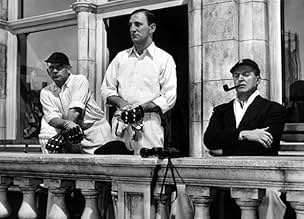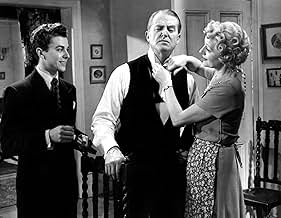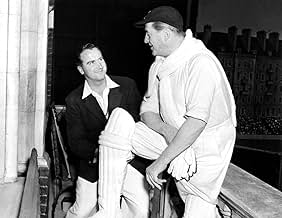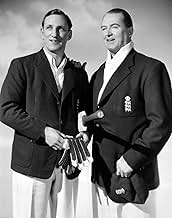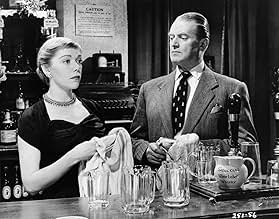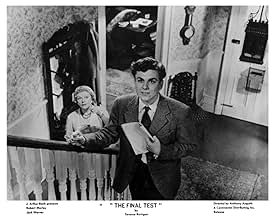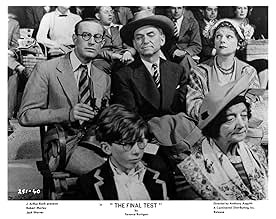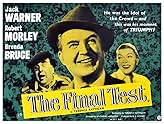Like Samuel Beckett and Harold Pinter, playwright Terence Rattigan was a cricket devotee. But non-fans need not shun "The Final Test": it contains little cricketing action, and the game's mysteries are sent up by having a baffled visiting American senator interrogate a supercilious Richard Wattis about them. The Test of the title is much more one of loyalty and of the relationship between an older and younger man, like weightier Rattigan works such as "The Winslow Boy", "The Browning Version" and "Man and Boy".
Quickly filmed after being one of the earliest British TV plays by an established writer, "The Final Test" is a cheap and cheerful comedy. Documentary footage of real play at the Oval, South London, is hardly up to "Zelig" standards in melding into the studio shots. The film stocks do not match, and the crowd's rush into the ground is evidently back-projected. The setting is less grand than one associates with Rattigan. It is Cowardesque in the vein of "This Happy Breed", with a sauce bottle on the dinner table: the hero, Sam Palmer, is a professional batsman who has done well enough to give his son a fee-paying education. The only "posh" character besides Wattis is Robert Morley's pompous poet and playwright, whom the literary-minded son would rather visit than watch his dad play his last innings against the Australian tourists. Luckily Morley proves to be a cricket maniac and all ends well.
Jack Warner's remarkable, belated rise from fairly blue music hall comic and Maurice Chevalier impersonator to one of Britain's leading character actors is consolidated here. He can be humorous, gruff, judicious... and all in the same scene if required. There is no trace of the over-expressiveness of so many comedians trying to act. Though pushing 60, Warner looks no older than the real doyen of the English side, Cyril Washbrook, who along with a handful of colleagues nervously plays himself (no role is harder for a non-pro). The widowed Warner has a fancy for a barmaid at his local pub, the gaunt Brenda Bruce, and he has his own retirement dilemmas to resolve: should he marry a woman who may have a past, and should he take a job coaching boys at Eton when his son is about to go to Oxford and mingle with Etonians on level terms?
"The Final Test" therefore has a few gentle remarks to drop about changing social values and snobberies in post-war Britain. Sam's captain, Len Hutton, urges him not to fuss so much about the pecking order: an amusing way of using a real-life character, since the great Yorkshireman was England's first professional cricket captain and would soon be knighted. Morley's TV play "Following a Turtle to My Father's Tomb", which Sam's son watches in rapture and which drives Sam out to the pub, is a spoof of the middlebrow poetic drama (TS Eliot, Christopher Fry) then in vogue, which Rattigan did not admire. One line, "the great dome of discovery that men call the sky", takes off the exhibit of that name in the recent Festival of Britain.
The deserved rehabilitation of Rattigan, with the likes of David Mamet doing him homage, gives fresh interest to a script which takes the boulevard playsmith outside his usual range. No doubt the film technicians' union approved the democratic spirit, since this was one of its occasional efforts, via ACT Films, at keeping its members in work. Director "Puffin" Asquith, though the son of an earl and ex-prime minister, was a keen union activist. Sam Palmer was Jack Warner's last big film part for a decade. He was soon to resurrect his slain copper from "The Blue Lamp" and become TV's most famous PC in "Dixon of Dock Green."

